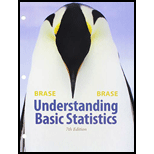
Concept explainers
The data in this section are taken from this source:
Based on King. Cuchlaine A. M. Physical Geography. Oxford: Basil Blackwell.
Throughout the world, natural ocean beaches are beautiful sights to see. If you have visited natural beaches, you may have noticed that when the gradient or dropoff is steep, the grains of sand tend to be larger. In fact, a man-made beach with the "wrong” size granules of sand tends to be washed away and eventually replaced when the proper size grain is selected by the action of the ocean and the gradient of the bottom. Since man-made beaches are expensive, grain size is an important consideration.
In the data that follow
| x | y |
| 0.17 | 0.63 |
| 0.19 | 0.70 |
| 0.22 | 0.82 |
| 0.235 | 0.88 |
| 0.235 | 1.15 |
| 0.30 | 1.50 |
| 0.35 | 4.40 |
| 0.42 | 7.30 |
| 0.85 | 11.30 |
Suppose you have a truckload of sifted sand in which the median size of granules is 0.38 mm. If you want to put this sand on a beach and you don't want the sand to wash away, then what does the least-squares line predict for the angle of the beach? Note: Heavy storms that produce abnormal waves may also wash out the sand. However, in the long run, the size of sand granules that remain on the beach or that are brought back to the beach by long-term wave action
are determined to a large extent by the angle at which the beach drops off. What
Trending nowThis is a popular solution!

Chapter 4 Solutions
Bundle: Understanding Basic Statistics, Loose-leaf Version, 7th + WebAssign Printed Access Card for Brase/Brase's Understanding Basic Statistics, ... for Peck's Statistics: Learning from Data
- 2. Which of the following statements are (not) true? lim sup{An U Bn} 818 lim sup{A, B} 818 lim inf{An U Bn} 818 818 lim inf{A, B} An An A, Bn- A, BnB →B = = = lim sup A, U lim sup Bn; 818 818 lim sup A, lim sup Bn; 818 81U lim inf A, U lim inf Bn; 818 818 lim inf A, lim inf Bn; n→X 818 An U BRAUB as no; An OBRANB as n→∞.arrow_forwardThroughout, A, B, (An, n≥ 1), and (Bn, n≥ 1) are subsets of 2. 1. Show that AAB (ANB) U (BA) = (AUB) (AB), Α' Δ Β = Α Δ Β, {A₁ U A2} A {B₁ U B2) C (A1 A B₁}U{A2 A B2).arrow_forward16. Show that, if X and Y are independent random variables, such that E|X|< ∞, and B is an arbitrary Borel set, then EXI{Y B} = EX P(YE B).arrow_forward
- Proposition 1.1 Suppose that X1, X2,... are random variables. The following quantities are random variables: (a) max{X1, X2) and min(X1, X2); (b) sup, Xn and inf, Xn; (c) lim sup∞ X and lim inf∞ Xn- (d) If Xn(w) converges for (almost) every w as n→ ∞, then lim- random variable. → Xn is aarrow_forwardExercise 4.2 Prove that, if A and B are independent, then so are A and B, Ac and B, and A and B.arrow_forward8. Show that, if {Xn, n ≥ 1) are independent random variables, then sup X A) < ∞ for some A.arrow_forward
- 8- 6. Show that, for any random variable, X, and a > 0, 8 心 P(xarrow_forward15. This problem extends Problem 20.6. Let X, Y be random variables with finite mean. Show that 00 (P(X ≤ x ≤ Y) - P(X ≤ x ≤ X))dx = E Y — E X.arrow_forward(b) Define a simple random variable. Provide an example.arrow_forward17. (a) Define the distribution of a random variable X. (b) Define the distribution function of a random variable X. (c) State the properties of a distribution function. (d) Explain the difference between the distribution and the distribution function of X.arrow_forward16. (a) Show that IA(w) is a random variable if and only if A E Farrow_forward15. Let 2 {1, 2,..., 6} and Fo({1, 2, 3, 4), (3, 4, 5, 6}). (a) Is the function X (w) = 21(3, 4) (w)+711.2,5,6) (w) a random variable? Explain. (b) Provide a function from 2 to R that is not a random variable with respect to (N, F). (c) Write the distribution of X. (d) Write and plot the distribution function of X.arrow_forwardarrow_back_iosSEE MORE QUESTIONSarrow_forward_ios
 Functions and Change: A Modeling Approach to Coll...AlgebraISBN:9781337111348Author:Bruce Crauder, Benny Evans, Alan NoellPublisher:Cengage Learning
Functions and Change: A Modeling Approach to Coll...AlgebraISBN:9781337111348Author:Bruce Crauder, Benny Evans, Alan NoellPublisher:Cengage Learning Glencoe Algebra 1, Student Edition, 9780079039897...AlgebraISBN:9780079039897Author:CarterPublisher:McGraw Hill
Glencoe Algebra 1, Student Edition, 9780079039897...AlgebraISBN:9780079039897Author:CarterPublisher:McGraw Hill Holt Mcdougal Larson Pre-algebra: Student Edition...AlgebraISBN:9780547587776Author:HOLT MCDOUGALPublisher:HOLT MCDOUGAL
Holt Mcdougal Larson Pre-algebra: Student Edition...AlgebraISBN:9780547587776Author:HOLT MCDOUGALPublisher:HOLT MCDOUGAL Big Ideas Math A Bridge To Success Algebra 1: Stu...AlgebraISBN:9781680331141Author:HOUGHTON MIFFLIN HARCOURTPublisher:Houghton Mifflin Harcourt
Big Ideas Math A Bridge To Success Algebra 1: Stu...AlgebraISBN:9781680331141Author:HOUGHTON MIFFLIN HARCOURTPublisher:Houghton Mifflin Harcourt Linear Algebra: A Modern IntroductionAlgebraISBN:9781285463247Author:David PoolePublisher:Cengage Learning
Linear Algebra: A Modern IntroductionAlgebraISBN:9781285463247Author:David PoolePublisher:Cengage Learning




